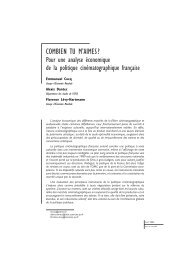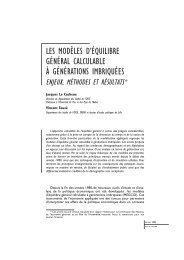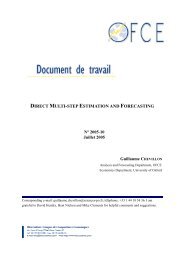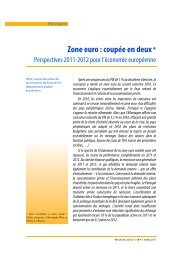N° 2005-09 Juin 2005 Guillaume Daudin* Jean-Luc Gaffard ...
N° 2005-09 Juin 2005 Guillaume Daudin* Jean-Luc Gaffard ...
N° 2005-09 Juin 2005 Guillaume Daudin* Jean-Luc Gaffard ...
Create successful ePaper yourself
Turn your PDF publications into a flip-book with our unique Google optimized e-Paper software.
International Relocation and Deindustrialisation: some French PerspectivesLast, companies operating in areas said to be ‘exposed to foreign relocation’ (areas witha high level of unemployment rate and a high share of industrial employment) are entitled to atax credit of euros 1,000 per worker.In all three cases, the measures have a limited amount. The costs expected in the <strong>2005</strong>Budget are respectively of 10, 50 and 330 million euros in <strong>2005</strong>. Until now, these strategiesare purely national and European rules are there to prevent their expansion. Is this asustainable position for industrial policies in Europe?France has suggested increased tax harmonisation in Europe, which would raisedifficult issues, because Member States wish to keep domestic fiscal autonomy and alsobecause low taxation rates are sometimes a convenient way to compensate for insufficientinfrastructure, low levels of economic development or company subsidies not being allowed.Making sure that the profit tax is based on the source principle, and not on the originprinciple, would avoid purely tax-motivated relocation. More, the fight against tax heavensshould be strengthened at a European or world levels. Companies and financial institutionsshould not be allowed to have branches in or to transfer funds to these countries.Company taxation amounted to 6.6% of GDP in France in 2002, ranking France 2 nd inthe EU-15, behind Luxemburg, against 6.4% in Italy, 5.2% in the UK, 3.5% in the US, 3% enSpain, 0.9% in Germany (where the figure was exceptionally low due to the tax reform). Thecurrent profit tax rate is 34.3% in France, at the level of the European average. It may benecessary to cut it down to 33.3%, but the effort to be done is limited (1.7 billion euros). Theproblem is not the level of profit taxation itself, but the fact that the wage tax (taxe sur lessalaires), the tax on real estate (taxe foncière) and the professional tax (taxe professionnelle)add to profit taxation.The professional tax is currently based on tangible assets (real estate and equipment)and particularly affects production industries. Reforming this tax has been debated for a longtime. Recently it has been suggested for instance in the Roustan Report (2004) and theGrignon Report (2004). The government has promised to reform the tax in 2006, withoutaffecting local administration funding and without increasing households’ taxation. The newtax could possibly be based on value added (at the expense of trade sectors and financialinstitutions).The French government refuses to undertake a global competitiveness strategy thatwould consist in cutting directly wages or reducing company taxation together with lowerpublic and social expenditures. In general, the search for competitiveness gains may beworthless, since the rise in competitiveness will be cancelled between European countries59








